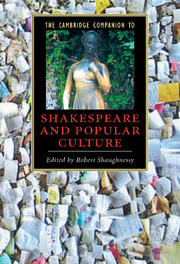Book contents
- Frontmatter
- Introduction
- 1 From popular entertainment to literature
- 2 Shakespeare abbreviated
- 3 Shakespearean stars: stagings of desire
- 4 Shakespeare illustrated
- 5 Shakespeare: myth and biographical fiction
- 6 Narration and staging in Hamlet and its afternovels
- 7 Shakespeare serialized: An Age of Kings
- 8 Musical Shakespeares: attending to Ophelia, Juliet, and Desdemona
- 9 Shakespeare overheard: performances, adaptations, and citations on radio
- 10 Shakespeare on the tourist trail
- 11 Performing Shakespeare in digital culture
- 12 Shakespeare’s popular face: from the playbill to the poster
- Further reading
- Index
- Series List
8 - Musical Shakespeares: attending to Ophelia, Juliet, and Desdemona
Published online by Cambridge University Press: 28 November 2008
- Frontmatter
- Introduction
- 1 From popular entertainment to literature
- 2 Shakespeare abbreviated
- 3 Shakespearean stars: stagings of desire
- 4 Shakespeare illustrated
- 5 Shakespeare: myth and biographical fiction
- 6 Narration and staging in Hamlet and its afternovels
- 7 Shakespeare serialized: An Age of Kings
- 8 Musical Shakespeares: attending to Ophelia, Juliet, and Desdemona
- 9 Shakespeare overheard: performances, adaptations, and citations on radio
- 10 Shakespeare on the tourist trail
- 11 Performing Shakespeare in digital culture
- 12 Shakespeare’s popular face: from the playbill to the poster
- Further reading
- Index
- Series List
Summary
The generally accepted theory is that the mood was specific.
Duke EllingtonFrom grand opera to hip-hop, the language, narratives, dramatis personae, and mythology of Shakespeare's works have served as resources of musical inspiration since their earliest performances and publication. Composers and songwriters have quoted from the plays and poems, have alluded to them, and have recycled them in ways that regularly call into question accepted divisions between serious and popular culture; between highbrow, middlebrow, and lowbrow artifacts; between mass-market and minority or emergent expression. In this essay, after briefly surveying Shakespeare's presence in musical theatre and other forms of popular music since the mid twentieth century, I will focus on the pivotal role of Shakespeare's Ophelia in marking and inspiring popular culture's enduring investment in Shakespearean texts. In Hamlet and in responses to the plays, Ophelia is implicated in materials that engage with societal concerns involving gender, generational conflict, racial identity, and sexuality.
Such concerns may still seem to speak more to our own times than to Shakespeare's; Terence Hawkes has connected this view of historicity with a residual tendency to set Shakespeare away from (and to set him “above”) popular, non-elite concerns, while also asserting his “eternal relevance” to the maintenance of the status quo. This tendency, however, did not fully emerge until the nineteenth century, although it grew more pronounced over time. Throughout the early twentieth century, Shakespeare continued to be shifted away from any categorization as popular entertainment: Lawrence Levine has charted the split as applied to Shakespeare specifically in United States culture into the categories of “highbrow” and “lowbrow”; some of the same dynamics, however, can be seen at work throughout Britain and Western Europe. Interestingly enough, a similar shift occurred mid-century with jazz music, which had once been dismissed as the lowest of the low by mainstream arbiters, as well as elite ones.
- Type
- Chapter
- Information
- The Cambridge Companion to Shakespeare and Popular Culture , pp. 150 - 174Publisher: Cambridge University PressPrint publication year: 2007
- 1
- Cited by



